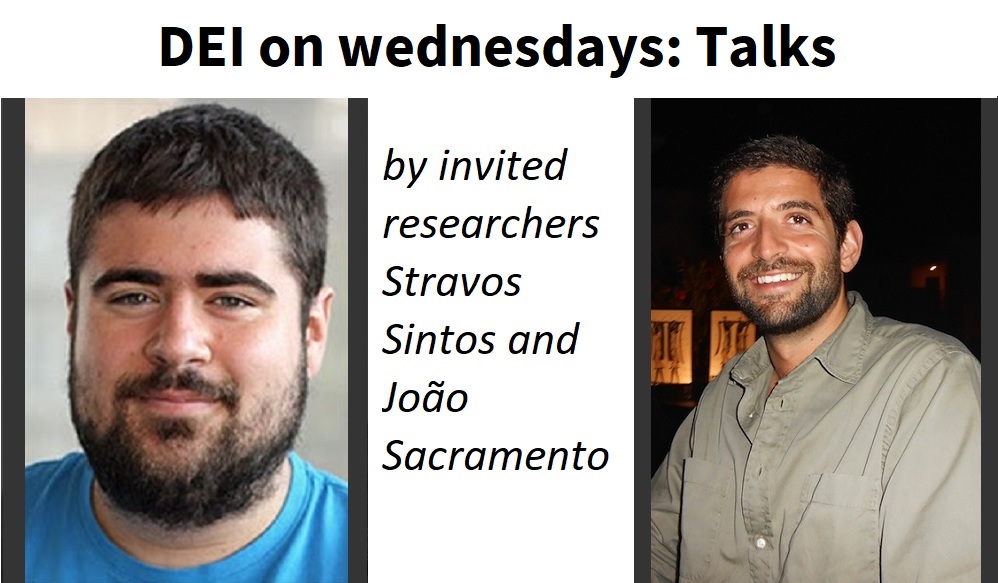DEI on wednesdays: Talks, 12-01-2022

--
Stravos Sintos: Efficient Indexes for Data Queries Combining Geometry with Query Processing
Abstract:
Query processing is an important problem in many research fields, including database systems, data mining, and geometric computing. The goal is to preprocess input data into an index to efficiently answer queries. With the data sets becoming increasingly large and complex, queries are also becoming complex, therefore new challenging problems have emerged in query processing. In this presentation, I show how to use techniques and notions from computational geometry to design efficient indexes for practical and complex data queries over big data.
The first part of the talk is on designing efficient indexes for Approximate Query Processing (AQP). I present PASS, an efficient index for answering range aggregation queries by combining hierarchical spatial partitioning and stratified sampling. PASS provides theoretical guarantees on the confidence intervals, it uses low space and answers queries with low latency. Interestingly, it outperforms the state-of-the-art AQP systems on aggregation queries. Furthermore, PASS can be extended to efficiently handle arbitrary insertions and deletions of items. In the second part of the talk, I will briefly describe how various top-k queries, such as diverse top-k, durable top-k, or uncertain top-k, can benefit from the design of geometric indexes. These top-k queries have many applications in areas such as search engines, online stores, sensor networks, and computational journalism. I will conclude the talk with some future research directions
Bio:
Stavros Sintos is a Postdoctoral Scholar on Data Management in the Department of Computer Science at the University of Chicago working with Asst. Prof. Sanjay Krishnan and Prof. Michael Franklin. Before joining the University of Chicago, he obtained his Ph.D. in the Department of Computer Science at Duke University under the supervision of Prof. Pankaj K. Agarwal. He also obtained his B.S. in the Department of Computer Science at the University of Ioannina in Greece. He is a recipient of the James B. Duke Fellowship, and he was nominated for the 2019-2020 outstanding Ph.D. dissertation award for his thesis titled “Efficient Algorithms for Querying Large and Uncertain Data”. His main research interest is in the design of efficient algorithms for problems in databases, data mining, and data management. In particular, he works on designing practical indexes with theoretical guarantees focusing on approximate query processing, top-k queries, and join queries. An important aspect of his research has been on combining geometric optimization with data science and query processing. His work has been published in top-tier conferences and journals such as VLDB, SIGMOD, ICDE, PODS, KDD, ICALP, JCSS. For more details, please visit https://sites.google.com/view/stavros-sintos
--
João Sacramento: Neuroscience-inspired machine learning algorithms
Abstract:
Neural networks are enabling great progress on difficult problems that require perceiving the world, making decisions, and taking actions. Unlike more traditional solutions, the behavior of these systems is not fully specified by their designer. Instead, taking inspiration from the brain, neural networks learn from experience, by modifying the computations performed by a very large number of simple interacting components. In my talk, I will describe some of my most recent work aiming at improving the learning capabilities of neural networks in situations where they are required to perform multiple distinct but related tasks. I will present novel learning algorithms for such multitask settings that can leverage task-to-task similarities to improve and speed up future learning of new similar tasks. Our algorithms are scalable, simple to implement, and come with some theoretical guarantees. Building on their simplicity of implementation in neural hardware and given the ethological relevance of multitask learning, I will then conclude by turning to neuroscience and briefly sketching a theory of lifelong learning in the brain.
Bio:
João Sacramento is a principal investigator at the Institute of Neuroinformatics of the Swiss Federal Institute of Technology (ETH Zurich). He is also a guest researcher at the Department of Computer Science of ETH Zurich, hosted by Angelika Steger's Combinatorial Structures and Algorithms group. João studied computer science and engineering at the Instituto Superior Técnico, where he obtained his B.Sc., M.Sc. and Ph.D. degrees in 2007, 2009, and 2014, respectively. Before joining the ETH Zurich, from 2015 to 2018, he was a postdoctoral researcher in Walter Senn's neuroscience laboratory at the University of Bern. João's research interests lie at the intersection of deep learning and neuroscience. With his students and collaborators, João develops neuroscience-inspired machine learning algorithms and builds theories which attempt to describe learning in the brain.
